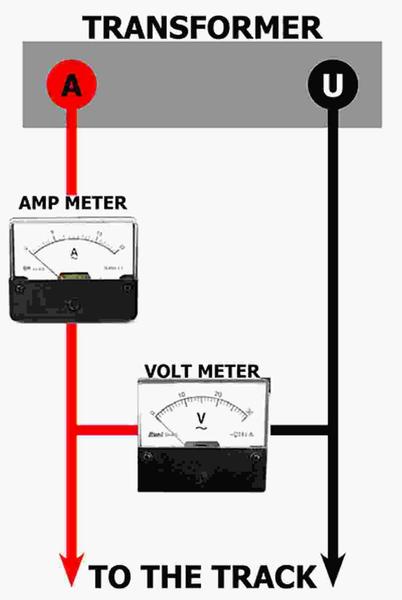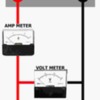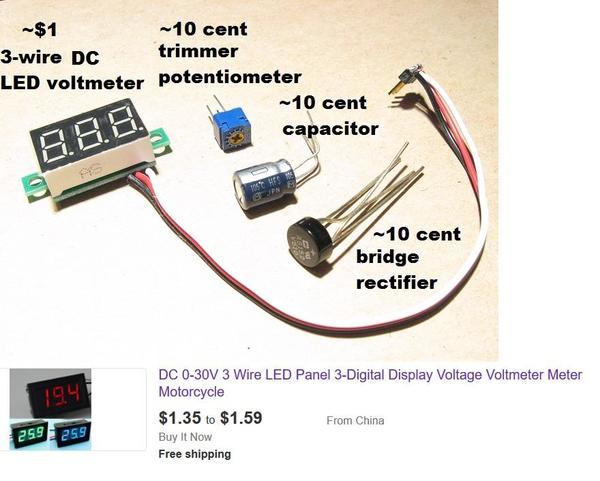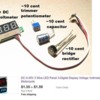Are volt and amp meters hooked up in series or parallel with the track from a transformer?
Replies sorted oldest to newest
Attachments
Does anyone know of a digital amp meter and/or volt meter that can run off track power instead of needing a separate power supply?
I run DCS at a constant 19.5 volts; could I resistor it down to what ever voltage the meter works on?
Thanks,
Waddy
Not many of those around Waddy, it seems most want a separate isolated power supply. You'll do good just to find a suitable digital voltmeter for the range you want!
RTR12, I came to this thread intending to post that meter connection diagram. You beat me to it! I made that diagram a long time ago. I'm pleased to see it's been saved and put to good use. Thanks!
As the diagram shows, the ammeter is wired in series and the volt meter is wired in parallel.
You are welcome and apologies for stealing your diagram. I had forgotten who posted it originally, but I have used it several times. Including when wiring my own meters on my layout. I'll mark it for proper credit in the future!
When I first started saving these diagrams I just put them in a folder. Now I have a bunch that I have no idea who posted? I have been trying to ID them as I find the OP's and I mark all the new saves.
No apologies necessary! I'm glad you posted it! Saved me the trouble... ![]()
Thanks!
"...could I resistor it down to what ever voltage the meter works on?"
Resistors are not used to reduce voltage. They are used to reduce current.
I suggest that you use an isolated supply for the meters (and anything else that requires an isolated supply) per the manufacturer's suggestions. Small isolated supplies, either AC or DC, are easy to find (wall warts for example) or to make.
"Resistor it down" was a bad choice of words. I'm actually thinking of using a regulator and a couple of capacitors.
Thank you!
use a resistor to get another range of your volt meter , it's the same as you will find in a multimeter if you switch to another range
the resistor has to be in series of your meter
for this you will have to know what is the resistance of your volt meter, and the resistor has to have a particular accuracy.
via that way you can mesure greater voltage than the origional range of your meter
good luck
Cor
Are there any of the digital meters that will work with ac power? I run Legacy and now have analogue meters for volts and amps but I would like to put a digital meter in to read amps, the analogue meter even with several trains running on the same track registers1 amp or less. The only time I get any readable number is if I run some of my pw A.C. Gilbert engines with the open frame motors.
Thanks
Ray
Rayin S, if you do find any, please post a link. These seem to have all but vanished. Not sure what has happened to them?
Yep, in the past, there were a number of options, and I still have several that I purchased "in case" in my parts drawers. However, all of the low voltage AC meters have vanished from eBay for some reason. I also have a number of DC meters that the various Chinese vendors tried to pass off as AC meters, but after some discussions, I did get refunded for those. I guess they didn't understand, when they advertise a voltmeter as an AC voltmeter, it really should measure AC voltage! ![]()
![]()
take a bridge rectifier and connect it for your DC volt meter, you can now mesure the AC volt
it will work, but it will not be verry precise
Cor
Not even close, I went that route at first but discovered that it was never going to have sufficient accuracy. I've toyed with the idea of building a small PCB that will measure true-RMS and output to a simple display, but it's just one of many interesting ideas. ![]()
Well it depends on what you mean by "close" or "precise" or "accurate". In this thread I showed for about $2 in eBay parts you can make a self-powered AC digital voltmeter. Picture from thread copied below. The thread has a video showing it in action vs. a Z-4000 digital voltmeter readout.
The "self-powered" feature makes it like a typical analog voltmeter where no external power supply is required to power the meter itself. But to make it self-powered you need more than a bridge rectifier since the digital electronic must have power when the AC voltage crosses zero; hence the need for a capacitor. The 10 cent trimmer calibrates the meter for best accuracy around the region (voltages) of interest.
Attachments
Yep, in the past, there were a number of options, and I still have several that I purchased "in case" in my parts drawers. However, all of the low voltage AC meters have vanished from eBay for some reason. I also have a number of DC meters that the various Chinese vendors tried to pass off as AC meters, but after some discussions, I did get refunded for those. I guess they didn't understand, when they advertise a voltmeter as an AC voltmeter, it really should measure AC voltage! ![]()
![]()
The issue with digital meters is often the true RMS measurement of non sinewave AC voltages. Most of the late variable transformers vary the effective RMS voltage by chopping up the sinewave and the most inexpensive meters do not read that correctly. The usual method for inexpensive meters is to rectify the AC, store the peak voltage and scale that down by .707. So you can do that and display the result on a DC meter. But it will be somewhat inaccurate over the range of voltages measured. For our purposes, it's probably just fine. It will be repeatable and that matters most to us. The maximum voltage of about 18 VAC will be most accurate. I think that's the method Stan2004 uses in his post above.








